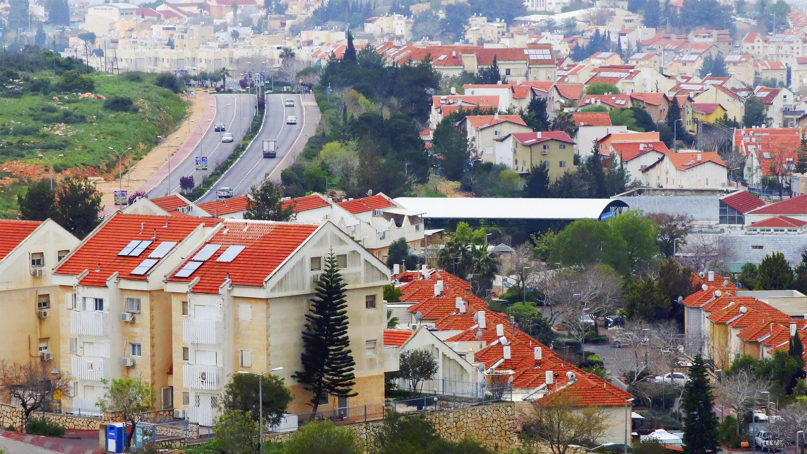(RNS) — Question: Who benefited from the White House’s recent announcement that the American administration would no longer view Israel’s West Bank settlements as illegal?
The United States itself? Hardly.
Israel? Hardly. It has never accepted the fact that such settlements are illegal.
American Jewry? Hardly. According to a recent AJC survey, 65 percent of American Jews believe that, as part of a peace agreement, Israel should dismantle at least some of the existing settlements.
So, who won?
The evangelicals.
These are the words of Mike Evans, an evangelical leader who is a founding member of the Trump Evangelical Initiative.
For Evangelical Christians and Israel supporters, for thousands of years, Judea and Samaria (West Bank) has been the “Bible land.” It was never illegal. The promises read by Christians and Jews were that God gave it to Israel and called it an “eternal covenant.”
Most Christians and Jews in America grow up reading the Bible that recounted the history of Judea and Samaria. They read of Hebron (Kiriath Arba) where Abraham purchased land with which to bury his wife Sarah in the Cave of Machpelah. Abraham, Isaac, and Jacob, as well as Rebekah and Leah were also buried there. It was King David’s first capital where he was also anointed as king.
Bethel was the site where Jacob dreamed of seeing angels ascending and descending a ladder to heaven. It is in the heart of what is called the West Bank, or Judea and Samaria.
First: let us bracket, for a moment, the debate over the status of the lands of the West Bank. Some people prefer the term “disputed” to “occupied.”
Why “disputed?”
Because the 1947 partition plan for Israel had established that territory, or a rough approximation of it, as an independent Arab state next to Israel. None of the Arab countries agreed to that plan. They invaded the nascent Jewish state, and Jordan grabbed that territory for itself.
Almost 20 years later, in the Six Day War, when Jordan entered the war, Israel seized that territory, which includes the eastern parts and walled city of Jerusalem, from the Jordanians.
That is a lot of history in very few words. But, because the 1948 war rendered that territory ownerless, there is considerable debate as to whether Israel is actually illegally occupying it.
The nuances of such debates are above my pay grade, but whether or not the territory is occupied, there is no question: The people — as in the Palestinians — are occupied, and they suffer the indignities of that occupation on a daily basis.
But, as for the evangelicals and those Jews who claim a biblical and historical “right to those lands,” I counsel a few words of caution and nuance.
Here, I turn, as I often do, to my friend and teacher, Yossi Klein Halevi.
For me, that land isn’t “occupied territory” but Judea and Samaria, which is how Jews have called it since biblical times. Jews in Judea are not aliens.
Are we ourselves to now destroy Jewish communities in the land of Israel — thriving towns and villages built around an organic Jewish life? … My generation was privileged to return to the lands that Jews, through the centuries of exile, dreamed of re-inhabiting. To be the generation that restored Jewish life to the hills of Judea and Samaria, only to uproot ourselves — voluntarily — will be a historic trauma.
I imagine that those words bring tears to any evangelical’s — and many Jews’ — eyes.
But, said Halevi:
If you tell me, [my Palestinian] neighbor, that Haifa belongs to you, my response is: I understand, from your perspective Haifa does belong to you. But the problem is that, from my perspective, Hebron belongs to me.
This is what Yossi is saying. Yes, both sides feel strongly — religiously and historically — about the land that was “theirs.”
But, Jewish teaching sees the avoidance of physical danger as a higher value than land.
My teacher, Micah Goodman, quotes Maimonides to say, yes, settling the land of Israel is a mitzvah, but not at the expense of one’s life. So, too, the late Sephardic chief rabbi, Ovadia Yosef, who ruled that if withdrawal from a piece of the land of Israel would save human lives, such a withdrawal is actually mandatory.
Yes, Hebron appears in this week’s Torah portion. Yes, Hebron appears in my mental map of the land of Israel.
But, no — that is not good enough.
And, frankly I am getting a little tired of American evangelicals telling me what lands should be mine.
Do me a favor, Dr. Evans and others.
When your kids are ready to move to Israel, and don uniforms, and stand at West Bank checkpoints in one hundred degree heat, and have to make a snap decision as to whether that seemingly pregnant Palestinian woman is really pregnant, or carrying a bomb.
Yes, those West Bank places occur in the Bible.
But, if the continued presence in those places puts Jewish lives in danger.
Don’t be brave with Jewish kids.






